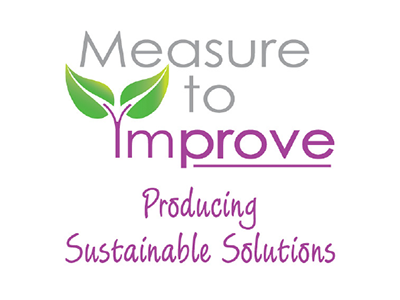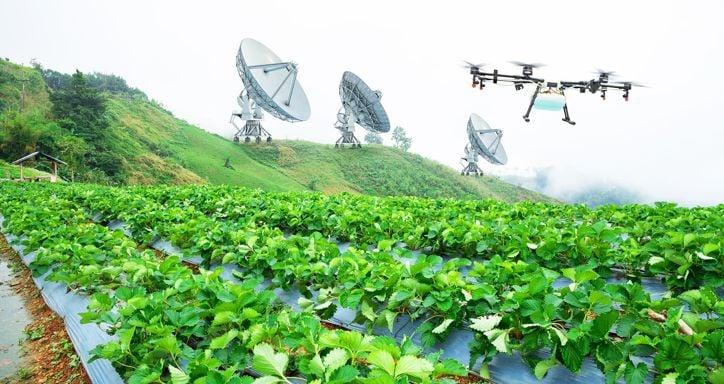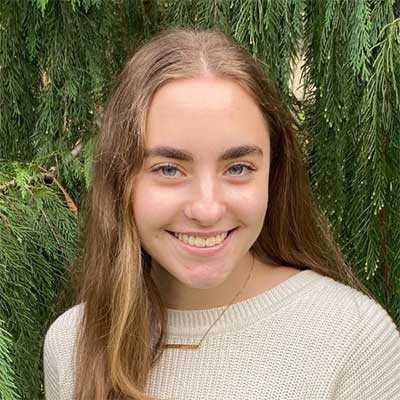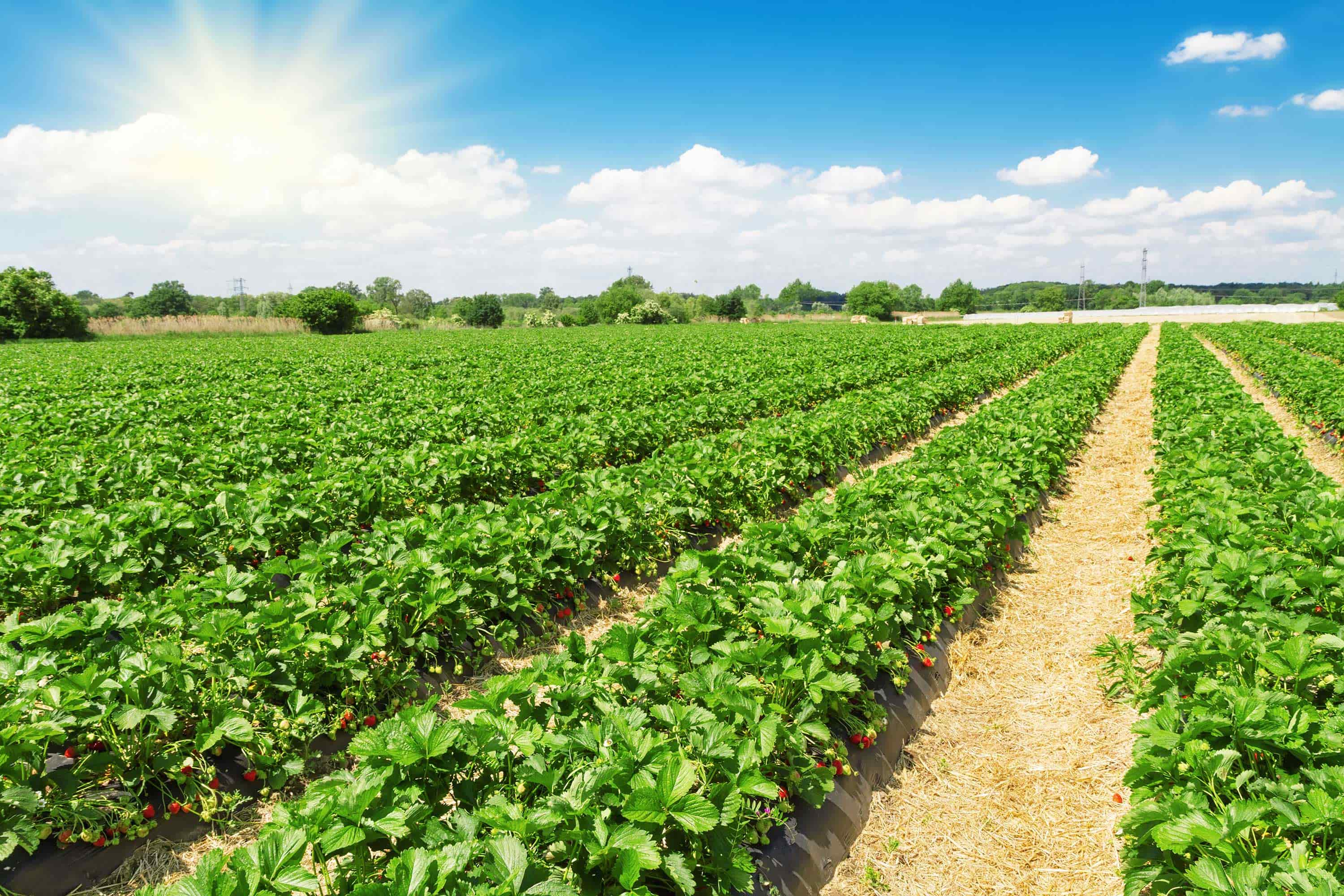IFPA was awarded a USDA Climate-Smart Commodities Grant for a project titled “A Vibrant Future.” The project aims to encourage the use of climate-smart production practices and to create effective tools to measure inputs, outputs (ecosystem services) and yields. It also involves setting up systems to track, verify and market climate-friendly produce.
IFPA will offer incentives to growers of specialty crops to adopt one of six climate-smart production practices, with the goal of creating a market for fruits and vegetables grown using these methods.
Our Partners

Who is eligible to participate
IFPA is looking to recruit growers of crops that would be most amenable to Climate Smart Practices primarily in: California, Florida, and Mississippi. We will also consider clusters of growers in other states.
Examples of eligible specialty crops:
- Annuals: Strawberries, tomatoes, carrots, onions, broccoli, kale, specialty greens, sweet potatoes
- Perennials (Short-Lived): Blueberries, cane berries
- Perennials (Long-Lived): Vineyards, Orchards
Why you should participate
- Cash incentive for participation
- Assistance with the development of personalized plans for the implementation of climate-smart practices
- Access to a certified pest control advisor and sustainability consultants
- Subscription to a software data platform
- Partial offset of direct costs involved in implementation of climate-smart practices
- Data collected on your site is benchmarked against aggregated data
Climate-Smart practices available for growers to trial
Expectations of project participants:
Growers: Each grower will be expected to participate in the program for 4 years, and to commit to the implementation of one climate-smart practices. The growers will make implementation sites available to data and information collection no more than twice a year.
Production Suppliers: Each supplier/vendor will be expected to participate in the program for 4 years and be willing to provide technical site-specific ssupport throughout the process.
To learn more about “A Vibrant Future: USDA Climate-Smart Pilot Project,” please visit the FAQ document or our on-demand webinars

Webinar
USDA Climate Smart Pilot Programs for Production Suppliers
Watch as IFPA and its partners discuss an exclusive opportunity tailored to production input suppliers offering tools or technologies for climate-smart agriculture.

Webinar
Grower/Shippers: USDA Climate Smart Pilot Programs
IFPA received a USDA grant for piloting climate-smart practices for specialty crops. Explore funding options for voluntarily participating in these trials.
Climate Smart Press Releases
- IFPA and Partners Receive $15M from USDA for Advancing Climate-Smart Pilot Projects
This project will incentivize growers of specialty crops to adopt climate-smart production to establish a consumer-driven market for fruits and vegetables.
This material is based upon work supported by the U.S. Department of Agriculture, under agreement number NR233A750004G078. Any opinions, findings, conclusions, or recommendations expressed in this publication are those of the author(s) and do not necessarily reflect the views of the U.S. Department of Agriculture. In addition, any reference to specific brands or types of products or services does not constitute or imply an endorsement by the U.S. Department of Agriculture for those products or services. USDA is an equal opportunity provider, employer, and lender.
Climate Smart Commodities Grower FAQ’s
- 4-year commitment to adopt at least one of the selected practices
- We estimate participation and data collection could take up to 50 hours.
- Participate in at least 2 field days per program. Field days will be held within 1-2 hr driving distance from most grower facilities.
- Collect and submit ALL required data when it’s due
- A grower must be able to verify the Climate Smart Practice Selected is new
Plot size addressed in IFPA FAQ
- There is no upper/lower limit on annual revenue, but it must be a functional commercial operation, not a hobby farm.
- No limit, at least 1 acre
- Current grower interest responses indicate willing to use between 15-20 acres
Examples of data that will be collected
Data will be submitted electronically. The Data Platform is still TBD
Additional information growers will be asked to share includes, but is not limited to:
- Pictures of the pilot site
- Visual observations noticed
- Recommendations
- Challenges and successes that can be shared with other growers to avoid duplicative efforts that don’t work
Data will be:
- Used to evaluate and validate program impact
- Transformed into dashboards once available and given full access to growers
- Saved only for the intended use and additional use of data will require permission
- Anonymized and aggregated to create AI models that can predict carbon sequestration based on selected practices and crops
- Used to inform future decision making and policy development on the impacts of regenerative agriculture.
USDA confirmed that they take data privacy seriously and will not share or release individualized data.
- Short Season Cover Crops (NRCS practice code 340)
- Grasses, legumes, forbs planted for seasonal vegetative cover
- Does not replace cash crops
- Nutrient Management (NRCS practice code 590)
- Manage rate, source, placement and timing of fertilization and soil amendment application while reducing environmental impacts
- Residue and Tillage Management (NRCS practices 328, 329 and 345)
- Limiting soil disturbance, reduce erosion, improve soil health
- Conservation crop rotation
- Alley Cropping (NRCS practice code 311)
- Trees or shrubs planted in single or multiple rows with cash crops
- Water Management (NRCS practice code 449, 355)
- Irrigation water management to control volume, frequency, application rate
- Irrigation system, micro irrigation (Practice code 441)
- Groundwater testing (Practice code 355), only in combination with other practices
- Grassed waterway (Practice code 412), shaped or graded channel established with suitable vegetation to convey water
- Drainage water management (Practice code 554) managing drainage of water. Must demonstrate that flooding occurs frequently
- Filter strip (Practice code 393), a strip of herbaceous vegetation that removes contaminants from overland flow
- Riparian forest buffer (Practice code 391)
- Soil Amendments (biochar, compost, mulches, biologicals)
For these practices, paperwork is required for environmental compliance
- Alley cropping (Practice code 311)
- Micro-irrigation (Practice code 441)
- Grassed waterway (Practice code 412)
- Riparian forest buffer (Practice code 391)
- Filter strip (Practice code 393)
The additional paperwork required includes:
- FSA Farm field tract maps with GPS coordinates to State and County
- Approximate acreage for the pilot
- Form CPA-52 needs to be filled out prior to contract signing
- Complete an AD-2047 (Customer Data Worksheet to facilitate the collection of customer data for Business Partner Record)
- Certify HELC and WC compliance via Form AD-1026, Highly Erodible Land Conservation (HELC) and Wetland Conservation (WC) Certification
- Certify that they are not a foreign person or entity.
Funding will be customized based on the grower’s chosen practice and acreage under climate smart practices.
There are two types of funding:
- Partial off-set of direct costs
- Up to $10,000/year to offset approximately 80% of direct cost of materials, soil testing, equipment, labor, and technical support
- Cash incentives
- Will be determined based on acreage committed, practice selected, percentage of total acreage committed to a practice
- This is to avoid duplicative efforts especially with shared association members.
- Grower data (individual or grouped) will not be shared with other projects or associations
 There will be rolling deadlines, and it is important that growers express interest using this QR Code. We will tailor communications to those who have expressed interest using this link
There will be rolling deadlines, and it is important that growers express interest using this QR Code. We will tailor communications to those who have expressed interest using this link
This will depend on the contract process between IFPA and the Growers
See Onboarding Process For Growers document
If there are no other growers of this commodity in the area, the grower will receive back only own data. For the modeling purposes, data will be uploaded in the COMET tool (where thousands of growers are currently uploading similar data sets via 140 funded projects), and the data – once transformed by COMET – does not have identifiable location tags.
Questions?

